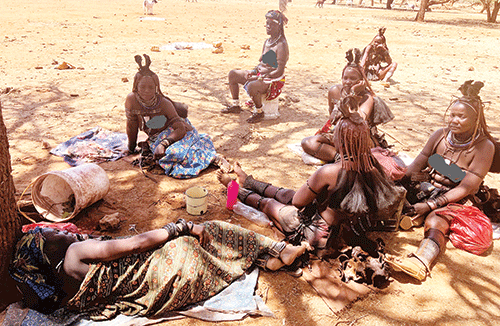KUNENE RIVER MOUTH – Persistent drought has become a critical factor which drove voters in the Kunene region to participate in this year’s elections.
Many residents, particularly at the Kunene River Mouth and Opuwo Rural constituency, cited the ongoing food insecurity as their primary motivation to vote.
Hitezeza Tjambiru, a farmer from Okakora, admitted that she previously voted out of a sense of civic duty.
This year, her motivation is hunger. “We are hungry. I am going to vote so that we can get food to eat. We haven’t been receiving food for some time, so I am casting my vote because we
need to survive,” she stated. For fellow voter Vatutunja Tjambiru, the impact of the drought extends beyond personal hunger to the broader issue of climate change.
“My goats are dying because of drought. You see the meat in the pot, it’s from a goat which we found dead this morning. Our livestock is perishing, and we are hungry. I am voting for change,” he said, pointing to a pot of boiling meat as he spoke to New Era.
For many in Kunene, the elections have become a platform to demand action on climate resilience, and hold leaders accountable for unfulfilled promises.
While some remain loyal to established parties, others are turning to alternative leadership they hope will prioritise the region’s survival, amid worsening environmental crises. Uazembuako Hepute, a first-time voter, expressed optimism that his vote would lead to positive changes. Meanwhile, Epson Muhuka, the traditional councillor of the Kavari royal house, echoed these sentiments.
“We stayed overnight with my people to ensure we cast our votes. We are hungry and desperate for change. Our livestock has died because of the drought, and we have nothing left. We need new leadership to improve the situation,” he reasoned.
The prolonged drought, now in its 15th year, has forced some residents near the Opuwo landfill to scavenge for food.
Currently, 35 002 households in the Kunene region receive drought relief, a figure that underscores the scale of the crisis.
Kunene governor Marius Sheya said 78 495 residents in the region are food-insecure this year, as revealed in his state of the region address earlier.
In October, this publication reported that Namibia is grappling with a funding shortfall of N$482 million to shield 1.26 million drought-stricken citizens from a looming hunger crisis.
These figures were released by Prime Minister (PM) Saara Kuugongelwa-Amadhila during the 9th Session of the Africa Regional Platform for Disaster Risk Reduction Conference.
At the time, she said of the planned N$1.6 billion drought relief programme, the government is currently facing a funding gap of N$482 million to reach an additional 373 276 households, which translates into 1.26 million people, or 41% of the country’s population.
“Therefore, the government is appealing for assistance. Positive responses to our appeal for assistance have been received from development partners, for which we are grateful.
Assistance comes in the form of cash and in-kind donations of food and equipment made directly to the government, and donations in cash and kind made through United Nations’ agencies,” she said.
The SADC region is currently going through one of the worst droughts in recent years, induced by the El Niño phenomenon.
“This situation resulted in threatened lives and livelihoods for about 58 million people, with food and water security severely compromised. This led to most member states declaring a state of disaster on account of drought. The region subsequently launched a joint appeal for assistance to supplement their national responses,” the PM noted.
All in all, Namibia has set a budget of N$1.6 billion to roll out a multi-faceted drought relief programme, which includes food assistance to vulnerable households, cash incentives for livestock farmers, and water provision for drought-hit communities.
In May, President Nangolo Mbumba declared a state of emergency on the protracted drought, which has seen the country’s aggregated cereal production of white maize, sorghum, pearl millet and wheat decreasing by 53%.
Dam levels countrywide have dropped by 69.7%. -ljason@nepc.com.na


